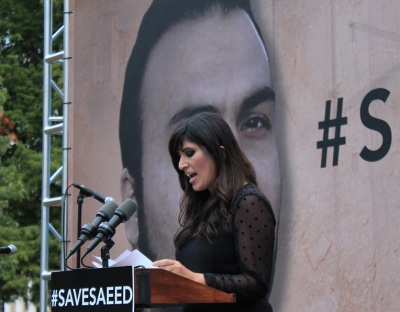US-Iran Diplomacy Fails to Bear Fruit for Imprisoned Pastor Abedini
Barrans said the ACLJ's position has always been that the release of the American prisoners should be a "precondition before even sitting down" for negotiations with Iran, yet at the same time, the group "never asked that their release should be written into the deal." She expressed disappointment, however, that the U.S. did not use the limited leverage it had with Iran during the nuclear talks to secure the release of prisoners.
During her own testimony to the House Foreign Affairs Committee in June, Sarah Hekmati — sister of Amir Hekmati, the former U.S. Marine imprisoned in Iran — said, "It does not make sense to our family how previous American prisoners in Iran have been released when the United States had no diplomatic relations with Iran and were not sitting across from them at a negotiating table much sooner than Amir."
"The only conclusion [Sarah Hekmati] came to, and frankly a lot of the families do, [is] that the nuclear talks themselves were such a high priority that the hostages were pushed to the back burner," Barrans told JNS.org.

Obama did meet with Naghmeh Abedini and her two children earlier this year, calling Saeed's freedom a "top priority" for his administration. Secretary of State John Kerry told MSNBC following the Iran deal, "There was not a meeting that took place [during the nuclear talks] — not one meeting that took place, believe me, that's not an exaggeration — where we did not raise the issue of our American citizens being held."
Amid those verbal assurances that the Obama administration is working towards the release of the Iranian detainees, Barrans said the ACLJ has focused its current efforts on Congress, which is in the midst of a 60-day period to review the Iran deal and might be able to exert some of its influence to help bring about the release of the prisoners.
"Now we realize that Congress holds the key in their review of this deal to really put the pressure both on the U.S. government and those inside of Iran, who want the deal and a reduction of sanctions, to release the Americans with the threat that they would vote the deal down," Barrans said.
Meanwhile, as post-deal tensions heat up in Iran between hardliners and pragmatists, some observers fear that the hardliners may decide against releasing Abedini to show that they haven't completely capitulated to the West. Pragmatists, in order to secure as much sanctions relief as possible for Iran, would presumably be more inclined to consider Abedini's freedom.
"There has definitely been increased violence inside of the prison by inmates towards Saeed, and tensions dramatically increased when the deal was signed. Certainly, his safety is compromised," Barrans said.
"Whether those holding the authority to release Saeed decide to make things more complicated and not release him, that is definitely a possibility," she said. "The internal politics inside of Iran is always difficult because they don't always take rational steps."
This article was originally published by JSN.org.




























